We have this agricultural land available, can we do something with it? With the answer to this question, the story of Jaldety Plant Propagation Nurseries started 32 years ago, when owners Rely and Nathan Jaldety decided to start producing unrooted cuttings of niche varieties of either annuals or perennials. With little knowledge of producing unrooted cuttings, they started slowly and gradually, and after 5 years of learning and gaining experience they decided to continue. Currently, they keep mother stock for the production of unrooted cuttings at two sites in Israel and have an assortment of about 450 niche annual and perennial varieties. Alongside, they grow private stock of around 170 varieties for different customers all over the world.
FloralDaily.com had the chance to see how they work and visited their two sites, of 1 ha each, in Kfar Hanagid, Israel.
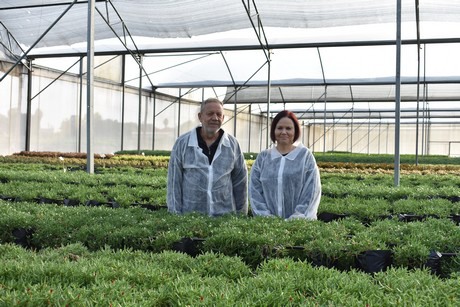
Nathan and Rely Jaldety at their second production greenhouse
Niche products
Jaldety is focused on niche products, and they are always looking for new niche products to add to their assortment. "Whenever it is an annual or perennial, if it is a niche product, and we see a future for it for the coming 5-6 years, we will consider producing it. We dedicate a lot of time and effort to this testing and evaluating process", Rely Jaldety says.
And this is also what makes them stand out. "Part of our products, you won't find at others because it is challenging to produce them and/or it has a lower yield compared to the mass production products."
A peek inside their first greenhouse
Selection
Currently, Jaldety works with around 15 breeders. "We do not breed ourselves. Every year, we make quite a few imports - we bring in material, test it and evaluate it. We check that it is true to type, can we produce it? What is the yield? How does it root? And how it transports for example. Once we have good hopes for the variety, we will continue to test it with customers. It is important that a new variety completes the entire test cycle. All in all, it takes at least one year to decide to go ahead with the variety."
Thunbergia
Thunbergia is Jaldety's biggest annual, but putting their vegetative varieties on the market was quite a challenge. "People were not used to vegetative Thunbergia, mostly seed. It took some time to make them familiar with the vegetative varieties and see the advantages of it, like more vigorous growth and more flower power."
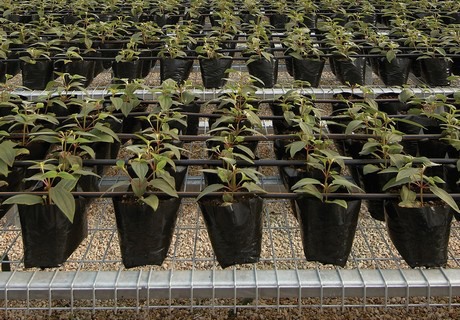
Plants are grown in plastic bags.
Mother plants
As Jaldety produces unrooted cuttings of both annuals and perennials, their greenhouse is filled all year round. "Over a period of a year, we tend to grow 2 growing cycles." Each section in the greenhouse has its own feeding. The plants are grown on benches and irrigated with a drip system. A little different compared to most is that the mother plants are grown in plastic bags. "The idea behind the bags is that it is, besides being relatively cheap, all bags are disposed at the end of their growing cycles and it produces less waste than plastic pots. When we clean the greenhouse, the plastic bags, the soil and the plant material are separated to 3 different garbage cans."
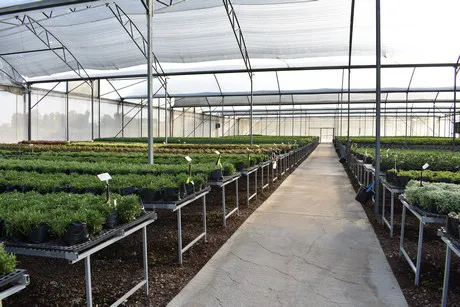
A look inside their second and newest greenhouse. "The structure is a bit taller, better ventilated, it has fans and sprinklers. In the summer, this, combined with the shade nets, gives us the opportunity to lower the temperature by around 4 degrees Celsius."
Unrooted cuttings
For the production of the unrooted cuttings, everything is being done on site. "From the start material, rooting, growing to mother stock, picking, quality control and packing. As we work with both annuals and perennials with different peak seasons, it takes quite a bit of planning to supply the freshest stock as possible."
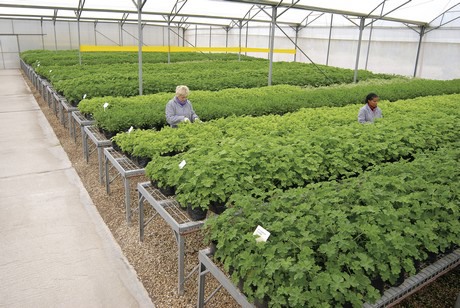
Trends
Regarding the trends in particular varieties, Jaldety does not see only one particular product standing out. "We supply all over the world, and different markets mean different needs. Therefore, it is difficult to notice only one trend. In some markets the end consumer tends to garden more and therefore will buy smaller plants in order to see them growing, while in other markets they prefer more ready-made products. This is often combined with a demand for low-maintenance plants, also varieties that are more drought tolerant. Plants with these characteristics are resistant plants (Gaura, for example) succulents and succulent-like plants.
"Flowering plants are still very popular, but compared to 10 years ago, we see more foliage plants combined with flowering plants.
"All in all, we often see that most customers are realizing that besides their mass products, their customers also need niche plants. The niche products help them to differentiate and stand out in the plant market."
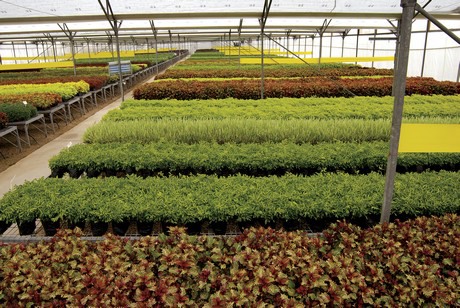
Foliage plants in full color.
For more information 
Jaldety
Rely Jaldety
Email: [email protected]
www.jaldety.com
